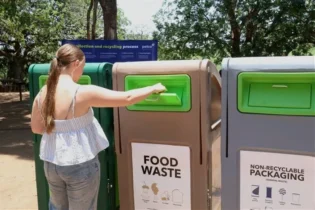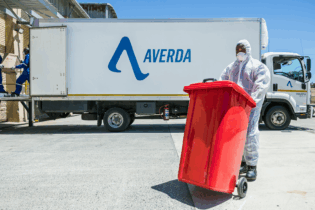The Vice President of the Institute of Waste Management of South Africa and principle researcher with the Council for Scientific and Industrial Research, Dr Suzan Oelofse, says that more than 9 million tonnes of food waste is generated per year in South Africa. Around 4% of this waste is generated by consumers which is around 7 kg per capita per year. Post-harvest, handling and storage contributes 26%, processing and packaging around 27%, agricultural production, 26% and distribution, 4%.
South Africa, as most other countries on the continent, has concerns about food security. The inter-dependence of developing countries with developed nations is a factor here, as is currently being seen with the projected food cost increase due to the drought in the US and subsequent drop in maize production. Mohamed Kajee the managing director of Foodbank South Africa estimates that between 12 and 14 million people in South Africa are currently food insecure. “This is an alarming number in a wealthy country like South Africa. It seems as though it is getting worse as we are seeing some startling statistics from rural areas. For instance, about 68% of rural people in the North West are food insecure.”On the environmental front there are particular concerns about food waste that is landfilled. The main problem with sending organic waste to landfill is the decomposition of the waste. This generates methane and leachate in the landfill which has not only the potential to drastically contaminate ground water but methane is also a greenhouse gas with 21 times the capacity of carbon dioxide to cause global warming. Spontaneous fires can also occur when the conditions of decomposition are favourable, which is risky not only to humans but contributes to air pollution.
To reduce food waste, Oelofse advises that consumers purchase foods that are produced close to home so as to reduce transport and consequently the spoiling of the food. Consumers must also store food properly and purchase only that which they are able to store. Cooking the correct amount for consumption is also important. Foodbank SA helps to reduce food waste by providing a platform through which food nearing expiry can be donated to those in need. Kajee estimates that about 6 000 tonnes of food is saved every year by the bank. This translates into 18 to 20 million meals per year. Foodbank SA is part of the Global Foodbank Network (GFN) and has adopted the safety standards recommended by that network. Foodbank SA staff are all trained in food safety to ensure adherence to these standards. In addition Foodbank SA is also audited by some of its larger donors on a regular basis to ensure that warehouses are sanitary and use proper pest control methods.





